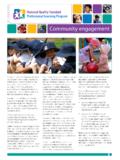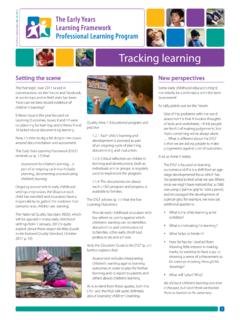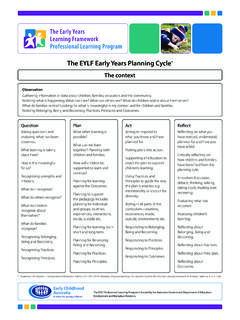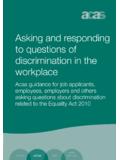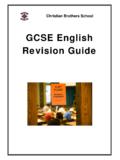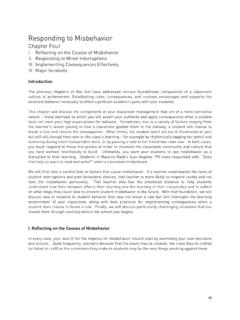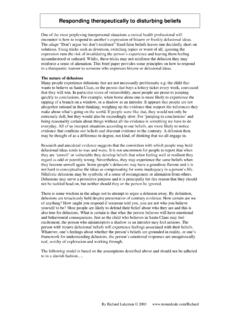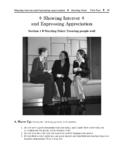Transcription of Promoting independence and agency - Early Childhood …
1 1 Childhood is a time of increasing independence . As children grow and develop they become more able to do things for themselves, to express themselves and to explore their world independently. As newborns we enter the world completely dependent on others for food, warmth, shelter and survival. Throughout our lives we remain connected to those around us. But we also strike out on our own, developing the confidence to explore and make sense of our surroundings, gradually becoming aware that we have influence and a measure of control over things that happen. Humans are fundamentally social creatures. We live in families and communities and actively seek connections with others. One of our key roles as educators is to help children to relate to others in positive and collaborative ways.
2 This emphasis on connection is strongly reflected in both the Early Years Learning Framework (EYLF) and the National Quality Standard (NQS). Alongside this sense of togetherness it is also important to help children develop a sense of themselves as individuals with their own skills, strengths, likes and dislikes. A focus on independence is sometimes criticised for Promoting an individualistic, all about me attitude. If we only focus on individualism then this may be the case. But if we place independence within the wider context of community, then we help children to recognise the value of thinking about yourself as well as others. Then they can begin to understand the responsibilities that go with being an individual and a member of a wider PLP e-Newsletter 2013 Promoting independence and agency Why does independence matter?
3 independence contributes to the development of self-esteem, identity and wellbeing. Doing something for yourself produces a powerful sense of achievement and success. When children have opportunities to make choices, to attempt tasks for themselves, and to take on increasing responsibilities, their sense of themselves as competent members of society grows. We have a sense of agency when we feel in control of things that happen around us; when we feel that we can influence events. This is an important sense for children to develop. Too often adults treat children as though they are incapable of making decisions or holding valid opinions. If instead we listen to and respect children s words and ideas, we model collaboration and cooperation and show that we recognise children s capabilities.
4 independence and agency in the EYLF and NQS Ideas relating to independence and agency are woven throughout the EYLF and the NQS, and are specifically mentioned in several places. Element of the National Quality Standard states: Each child s agency is promoted, enabling them to make choices and decisions and influence events and their world. (Guide to the National Quality Standard, ACECQA, 2011, p. 19).2 Example: Providing children with a range of materials and resources from which they can freely choose allows them to exercise their independence and make their own decisions about what they will do. A learning environment that is orderly and organised so that children can select resources and activities sends the message that we trust children to make choices about the materials that they want to use and when they might want to use them.
5 Once children become accustomed to greater independence and free access to materials, educators are better able to concentrate on engaging and interacting with the children rather than fielding constant requests for something else from the , the EYLF s Learning Outcomes recognise the following: Children develop their emerging autonomy, inter-dependence, resilience and sense of agency (Learning Outcome , p. 22). Children take increasing responsibility for their own health and physical wellbeing (Learning Outcome , p. 32). Children are confident and involved learners (Learning Outcome 4, p. 34).For children to reach these outcomes we need to provide them with opportunities to develop the confidence to explore their world, to ask questions, to express ideas, to get things right, but also to understand that you can be wrong and learn from mistakes.
6 Key learning dispositions such as curiosity, creativity and imagination, and learning processes such as inquiry, experimentation and investigation all presuppose a degree of choicesAllowing children to make choices for themselves is an important yet relatively easy step towards encouraging independence and agency . When we make materials and resources easily accessible, without the need for adult assistance, we promote children s ability to resource their own learning independently and environments that allow children to choose whether they want to be indoors or outdoors, or whether they want to be alone or with company, encourage children to be aware of and take responsibility for their own preferences. Flexible arrangements around eating, sleeping, drinking, toileting and other routine parts of the day also encourage children to be responsible for their own physical needs and wellbeing.
7 For older children, voting and other group processes for reaching agreement can help to give a sense of democratic decision-making in action. Sometimes we avoid offering choices because that may not be compatible with an efficient daily routine. From an educator s perspective children s differing choices have the potential to complicate our day. Lunchtime, where a group of toddlers can serve their own lunch, is unlikely to be as quick or tidy as it might be if the meals are served up by an adult. Yet, if we recognise the importance of choices for children s sense of identity and wellbeing, then we will gladly accept such complication as a legitimate part of what we do. An environment without choices quickly becomes institutional; the exact opposite of what we want for children, families and for ourselves.
8 Of course, total free rein is not necessarily desirable either. While children are certainly capable of making many choices, their ability to do so develops over time and with guidance. Our role as educators is to help children develop the decision-making skills needed to make good choices, to help them to recognise the options that are available, and to recognise the responsibilities that come with particular preferences, while being a member of a group. When introducing children to choice it can be helpful to start with a small number of options. As children get used to making their own decisions then the number of options provided can be increased. To go from no choice to total choice is a disorienting experience.
9 As educators, we can help to smooth this transition and ensure that children develop the ability to make successful decisions by providing a level of choice that is not overwhelming. 3 Real tasks and responsibilitiesAnother way to develop independence is through providing real tasks and challenges that allow children to attempt difficult and challenging work. Experiences that are not simple and that require practice and perseverance help children to become resilient and provide a sense of tremendous achievement. Cooking, gardening and woodwork are all examples of experiences that provide opportunities to use real tools or utensils and complete real adult work. The sense of satisfaction that comes from doing something grown up is hard to overestimate.
10 Children live in a world where they are continually reminded that they are not grown up yet, and that there are many things they are not yet ready to do. Often there are good reasons for such restrictions. But even so, the constant feeling of not being able to do things can be damaging to children s sense of self and their ability to demonstrate their capabilities (rather than just their limitations). Perhaps this is why children respond so enthusiastically to real a recent episode of the NQS PLP s Talking about practice series educators at the Dorothy Waide Centre for Early Learning talked about the importance of risk-taking and challenge for children, and provided the example of children participating in woodwork experiences where they were able, under careful supervision, to use real tools and materials to make their own constructions.



